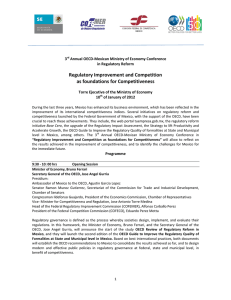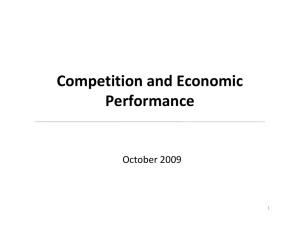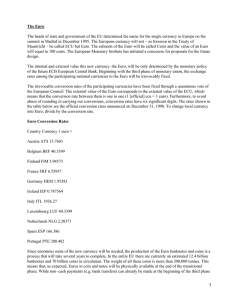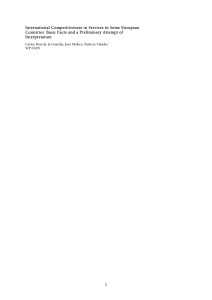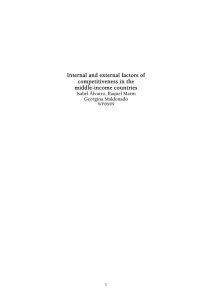The National Productivity Boards - European Parliament
Anuncio
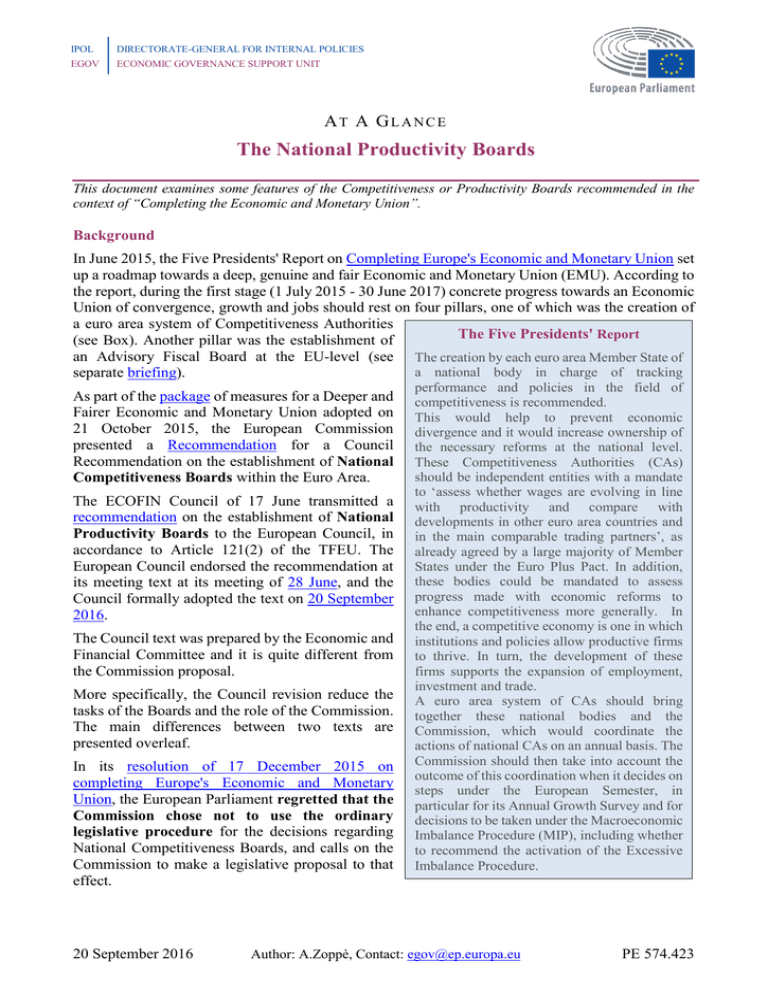
IPOL DIRECTORATE-GENERAL FOR INTERNAL POLICIES EGOV ECONOMIC GOVERNANCE SUPPORT UNIT AT A GLANCE The National Productivity Boards This document examines some features of the Competitiveness or Productivity Boards recommended in the context of “Completing the Economic and Monetary Union”. Background In June 2015, the Five Presidents' Report on Completing Europe's Economic and Monetary Union set up a roadmap towards a deep, genuine and fair Economic and Monetary Union (EMU). According to the report, during the first stage (1 July 2015 - 30 June 2017) concrete progress towards an Economic Union of convergence, growth and jobs should rest on four pillars, one of which was the creation of a euro area system of Competitiveness Authorities The Five Presidents' Report (see Box). Another pillar was the establishment of an Advisory Fiscal Board at the EU-level (see The creation by each euro area Member State of a national body in charge of tracking separate briefing). As part of the package of measures for a Deeper and Fairer Economic and Monetary Union adopted on 21 October 2015, the European Commission presented a Recommendation for a Council Recommendation on the establishment of National Competitiveness Boards within the Euro Area. The ECOFIN Council of 17 June transmitted a recommendation on the establishment of National Productivity Boards to the European Council, in accordance to Article 121(2) of the TFEU. The European Council endorsed the recommendation at its meeting text at its meeting of 28 June, and the Council formally adopted the text on 20 September 2016. The Council text was prepared by the Economic and Financial Committee and it is quite different from the Commission proposal. More specifically, the Council revision reduce the tasks of the Boards and the role of the Commission. The main differences between two texts are presented overleaf. In its resolution of 17 December 2015 on completing Europe's Economic and Monetary Union, the European Parliament regretted that the Commission chose not to use the ordinary legislative procedure for the decisions regarding National Competitiveness Boards, and calls on the Commission to make a legislative proposal to that effect. 20 September 2016 performance and policies in the field of competitiveness is recommended. This would help to prevent economic divergence and it would increase ownership of the necessary reforms at the national level. These Competitiveness Authorities (CAs) should be independent entities with a mandate to ‘assess whether wages are evolving in line with productivity and compare with developments in other euro area countries and in the main comparable trading partners’, as already agreed by a large majority of Member States under the Euro Plus Pact. In addition, these bodies could be mandated to assess progress made with economic reforms to enhance competitiveness more generally. In the end, a competitive economy is one in which institutions and policies allow productive firms to thrive. In turn, the development of these firms supports the expansion of employment, investment and trade. A euro area system of CAs should bring together these national bodies and the Commission, which would coordinate the actions of national CAs on an annual basis. The Commission should then take into account the outcome of this coordination when it decides on steps under the European Semester, in particular for its Annual Growth Survey and for decisions to be taken under the Macroeconomic Imbalance Procedure (MIP), including whether to recommend the activation of the Excessive Imbalance Procedure. Author: A.Zoppè, Contact: egov@ep.europa.eu PE 574.423 Competitiveness and Productivity The Council replaces the Competitiveness Board with Productivity Boards almost everywhere in the text of the recommendation. Tasks of the Boards In the Commission text, the Boards were tasked: to monitor performance and policies in the field of competitiveness in Member States; informing the wage setting process by providing relevant information; and Assessing policy challenges and formulating policy advise in the field of competitiveness and on the implementation of Country Specific Recommendations. According to the text as revised by the Council the Boards are tasked: diagnosis and analyse of productivity and competitiveness developments in the MS; and Independent analysis of policy challenges in the field of productivity and competitiveness. The role of the Commission According to the Commission text, the Commission was tasked to coordinate the activities of the Boards and take into account inputs from the system of Boards in the context of the European Semester, including the MIP and the Country Specific Recommendations. The Council text reads: “the Commission could facilitate the exchange of views among the national boards”, and discussions should take place with the Economic Policy Committee. The annual reports could be used by Member States and the Commission in the context of the European Semester. Composition and independence According to the Commission, Competitiveness Boards should be structurally independent and underpinned by national legal provisions, including a statutory regime grounded in national laws and adequate resources. According to the Council, Productivity Boards should be endowed with functional autonomy vis-avis any public authority. To fulfil their tasks, they should be underpinned by national provisions ensuring a high degree of functional autonomy and accountability, including: the capacity to communicate publicly in a timely manner; procedures for nominating members on the basis of their experience and competence; Appropriate access to information to carry out their mandate (the reference to appropriate resources in the Commission text was dropped). Productivity boards should be objective, neutral and fully independent regarding analysis and content. They may consult relevant stakeholders, but should not convey only or mainly the opinions and the interests of a particular group of stakeholders. They should have the ability to carry out economic and statistical analyses with a high degree of quality, including as recognised by the academic community. The analysis could be produced by existing and separate bodies provided that it is of the same high quality. Transparency and accountability Both the Commission and the Council text states that the Productivity Boards should make their analyses publicly available. Timing The original deadlines proposed by the Commission for the implementation of the recommendation and for the Commission progress report were 6 months and 12 months respectively since the adoption of the decision. The Council changed these two deadlines into 18 months and 30 months respectively. DISCLAIMER: This document is drafted by the Economic Governance Support Unit (EGOV) of the European Parliament based on publicly available information and is provided for information purposes only. The opinions expressed in this document are the sole responsibility of the authors and do not necessarily represent the official position of the European Parliament. Reproduction and translation for non-commercial purposes are authorised, provided the source is acknowledged and the publisher is given prior notice and sent a copy. © European Union, 2016 PE 574.423 2

